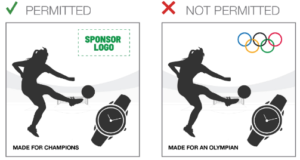18th October 2019
POV: Amended Rule 40: Marketing With Olympic Athletes At The 2020 Games
Background:
Earlier this year the IOC relaxed the restrictions placed on Olympic participants during the Olympic Games under Bylaw 40.3 of the Olympic Charter (colloquially known as “Rule 40”), allowing brands to use an Olympian’s likeness for endorsement advertising or “personal sponsor” purposes within certain restrictions.
Now, the US Olympic and Paralympic Committee (“USOPC”) has released their guidance on the updated Rule 40, which will have massive ramifications for how the marketplace can use athletes competing for Team USA at the 2020 Olympics, especially for brands that are not official IOC or Team USA sponsors.
Details and Implications:
The Big Change: Brands that aren’t official IOC or Team USA sponsors can now feature Olympic athletes in communications during the blackout period, during the games, but only under certain circumstances and for two types of marketing: 1) generic marketing of the product, service, and brand that includes one or more Olympic athletes, or 2) athlete-focused marketing reflecting a personal sponsor’s support of an athlete’s participation in the Olympic Games.
There Are Still Strict Rules: Rule 40 has evolved in the last two decades, but unlike recent Olympics that featured costly procedures and burdensome timelines, the new process is much simpler. For the 2020 Tokyo games, brands are no longer required to submit campaigns for pre-approval and they won’t have deadlines to get campaigns in market. Instead, athlete just register their sponsor with the USOPC. The sponsor must sign a “Personal Sponsor Commitment,” providing the IOC the legal authority to pursue repercussions against brands should there be violations. The accountability is now shared by athletes and their sponsors, whereas in Olympics past, only the athletes could be punished.
How Generic is Generic? Brands agree during the blackout period to refrain from using Olympic trademarks, iconic Olympic imagery, venue or apparel imagery, and any kind of storytelling that implies the advertiser is a sponsor of the games. In addition, brands must agree that the marketing campaign will not increase in frequency during the blackout period, instead reflecting and continuing the pre-existing relationship between the sponsor and athlete. Here is an example provided by USOPC:

Just Say Thanks: The USOPC will approve two forms of athlete-focused digital marketing: 1) Athletes thanking personal sponsors, and 2) Personal sponsors recognizing athletes or their performances. Athletes may post a total of seven thank-you messages that include references to approved personal sponsors.
Permitted messaging includes “Thank you @company for supporting my journey,” whereas “Thank you @company. You made my Olympic dreams come true” would not be permitted. In terms of congratulatory messages from sponsor to athlete, advertisers may create and post only one congratulatory message on its social media channels or corporate website targeted to a US audience. “Congratulations @athlete on your 100-meter performance” would be allowed whereas “Congratulations @athlete on your Olympic gold medal” would not.
Summary:
There is a tremendous amount of upside for non-IOC or Team USA sponsors, including the ability to use Olympic athletes during the blackout period, no mandatory advance campaign submission, and a more permissive system. However, by signing a contract with the USOPC, these parties are committing themselves to a direct legal relationship that allows officials to seek damages or equitable relief for perceived Rule 40 breaches, quickly and efficiently. It will be incumbent on brands and their agencies to diligently comply with the new parameters for successful campaign implementation.
The amended changes to Rule 40 represent a larger global trend supporting athletes’ autonomy to monetize their name and likeness. The new approach is a step forward for athletes, for the brands that want to tap into the emotional power of Olympians, and for the inspirational narratives that can be shared in a larger cultural arena. It will be interesting to see how much further the pendulum swings to provide current Olympic athletes and non-Olympic advertisers additional flexibility to partner as we get closer to the Tokyo Games.
Further Reading: